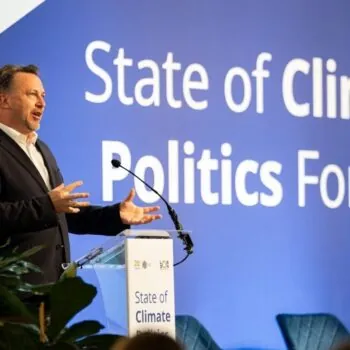During 15-19th June 2015, E3G ran a transatlantic climate roadshow, holding a series of dialogues on climate risk & security in Brussels, Berlin and Riga.
We were joined by US experts Vicky Arroyo, Executive Director of the Georgetown Climate Center, Alden Meyer, Director of strategy and policy Union of Concerned Scientists, Christine Parthemore, Director for climate and food security, Centre of American Progress and David Reed, Senior Advisor at WWF USA on food and security. The series built on the Trans-Atlantic climate security conversation held by E3G in March 2012 with US defense and intelligence experts.
The aim of the roadshow was to share valuable lessons from the other side of the Atlantic on managing climate risk and building resilience. The US is currently ahead of most other nations in translating assessments of climate security risks into strategic, operational and procurement decisions.
In Europe the same level of sophisticated understanding or discussion on climate risk is lacking and there is a danger of underestimating and consequently mismanaging the risks Europeans face. E3G’s analysis on this in our publications on Degrees of Risk and Underfunded, Underprepared, Underwater? Cities at Risk shows that across all levels of governance, current responses to climate change are failing to manage effectively the full range of climate security risks.
What’s happening in the US?
One factor behind why the US is so advanced in assessing and managing risk is its vulnerability to impacts. Recent events such as the severe floods in Texas this year, Hurricane Katrina and Superstorm Sandy are driving action on resilience. A lot is happening at local and state level and many cases communities and states, including Republican governors, are ahead of the federal government and State leaders and actions are informing the federal dialogue/policies.
The US has had to take action on climate resilience because of the reality of the impacts. This is shifting the politics and outdated denier, anti-science politics do not fly with younger and moderate voter groups. While Congress climate deniers continue to hit the news headlines, they are a lagging indicator of where the true centre of gravity is on US climate politics. The Obama administration has made climate change a political priority has shown it gets climate risk. The Executive Order on Preparing the United States for the Impacts of Climate Change has brought in significant, long lasting changes to government operations. All government agencies now have to figure out how climate risk impacts their operations – from the forestry service, park service, and the coastguard.
Businesses are moving too. Companies as diverse as Coca-Cola and Bank of America back the White House’s climate action and are examining their business operations, including the supply chain impacts and understanding how climate impacts can pose a fundamental risk to their model. This is changing the stakes and demands ahead of Paris.
The security community in the US is the most advanced, describing climate change as a direct threat to national security and its core interests and a contributing factor to increased natural disasters, refugee flows, and conflicts over basic resources. This is a dramatic shift from the way climate was previously tackled. The US Government has comprehensive set of activities to do this, including extensive data collection, multidisciplinary analysis, development of strategic guidance and presidential instruction.
Climate risk in Europe, Paris and beyond
In Europe, energy security events are driving significant internal reforms that may transform the European low carbon transition but there is limited discussion and knowledge about the climate impacts Europe is experiencing now and could face with 2, 3 or 4°C warmer world. At our dialogue in Brussels, over 80 stakeholders from government, business, politics and civil society came together to discuss what the risks of climate change might mean for different European sectors – including cities, food & drink, finance, defense, humanitarian community. In each of these areas, many of the greatest risks identified were outside Europe’s borders. Climate impacts on crop yields, water resources, food import, security and migration flows are unpredictable and pose a significant risk to Europe’s peace and prosperity.
Our discussions in Berlin came off the back of the German G7 presidency where leaders had committed to a climate risk insurance scheme in developing countries. This raises the question of whether we could usefully have similar schemes in Europe. Many European cities are facing challenges with uninsurable areas against flood protection and it’s clear that EU citizens and businesses are always affected the most by extreme weather events.
Whatever the outcome at COP21 in Paris, climate change is already a reality, and there is a need to start planning for scenarios that involve significant risk and disruption. As we look beyond the Paris agreement, critical decisions need to be taken on infrastructure choices, energy systems, financial investment and international development cooperation to ensure we are prepared for likely climate impacts. The conclusions from our dialogues were that responding to this involves a better understanding of the risks we face, the responsibilities and the reforms to manage climate impacts.
All actors need to understand climate risk a much deeper way, embracing uncertainties and informing decision making with better data on long tail risks, worst case scenarios and second and third order impacts. This needs to come with a stronger social contract, defining clear rights and responsibilities to manage climate risk. Undertaking this will require reform to our operations, systems, institutional and legal structure to ensure there are duties, responsibilities and disclosure requirements on climate risk. Ultimately, we have a choice between a disorderly or orderly transition. If we fail to manage climate risk, we face a disorderly transition driven by events and tipping points.



